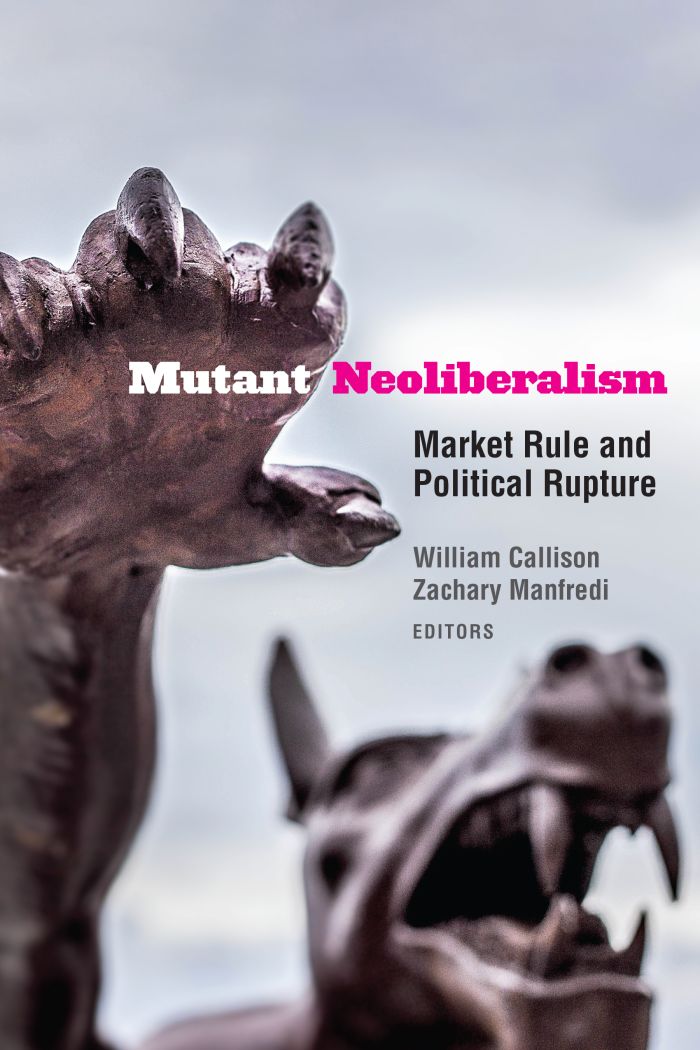Mutant Neoliberalism
Market Rule and Political Rupture

This book can be opened with

Tales of neoliberalism’s death are serially overstated. Following the financial crisis of 2008, neoliberalism was proclaimed a “zombie,” a disgraced ideology that staggered on like an undead monster. After the political ruptures of 2016, commentators were quick to announce “the end” of neoliberalism yet again, pointing to both the global rise of far-right forces and the reinvigoration of democratic socialist politics. But do new political forces sound neoliberalism’s death knell or will they instead catalyze new mutations in its dynamic development?
Mutant Neoliberalism brings together leading scholars of neoliberalism—political theorists, historians, philosophers, anthropologists and sociologists—to rethink transformations in market rule and their relation to ongoing political ruptures. The chapters show how years of neoliberal governance, policy, and depoliticization created the conditions for thriving reactionary forces, while also reflecting on whether recent trends will challenge, reconfigure, or extend neoliberalism’s reach. The contributors reconsider neoliberalism’s relationship with its assumed adversaries and map mutations in financialized capitalism and governance across time and space—from Europe and the United States to China and India. Taken together, the volume recasts the stakes of contemporary debate and reorients critique and resistance within a rapidly changing landscape.
Contributors: Étienne Balibar, Sören Brandes, Wendy Brown, Melinda Cooper, Julia Elyachar, Michel Feher, Megan Moodie, Christopher Newfield, Dieter Plehwe, Lisa Rofel, Leslie Salzinger, Quinn Slobodian
Neoliberalism has frequently been pronounced dead in the wake of the 2008 financial crisis, but the beast lives on. This collection is a strong addition to recent studies of the topic, exploring neoliberalism’s relationships with the EU, the far right, populism, and gender.—Doug Henwood, Producer of Behind the News
This is the book we need today. The authors refuse to debate about what liberalism ‘is’ and instead take us into the thicket of its fracturing and multiple futures in the wake of the great financial crisis.—Elizabeth Povinelli, Columbia University
In the debate over what neoliberalism was, whether or not it died, the question of what it morphed into has not been explored. Until now. Callison and Manfredi take up that challenge in this collection of essays by leading scholars... the essays, taken together, provide an extended examination of the possible mutations of neoliberalism that scholars will explore in their future work.—Choice
Viewed in terms of mutation, neoliberalism can be understood as containing various genes and genres that were innocent enough at their birth, but which adapt and grow in response to history, often in malign ways. It’s a valuable framing and a terrific collection of pieces, that has helped me look back on my own work and that of other neoliberalism scholars in a fresh light.—William Davies, Goldsmiths, University of London
Engaging with neoliberalism and its mutations, offers us a way to think about the complexity and struggle of the way forward... Callison and Manfredi’s collection refuses to offer guarantees about the end of neoliberalism, or even the end of the beginning. But... this collection offers critical insights about how to strategize and struggle against it.—Corinne Blalock, Executive Director of the Law and Political Economy Project
Mutant Neoliberalism is an excellent collection of essays canvassing what editors William Callison and Zachary Manfredi rightly diagnose as the changing face of neoliberalism–really, the multiplicity of national, transnational and post-national neoliberalisms–evolving in the aftermath of the 2007-2008 financial crisis.—David Singh Grewal, UC Berkeley School of Law
William Callison is Visiting Assistant Professor of Government and Law at Lafayette College. He is co-editor of “Rethinking Sovereignty and Capitalism” (Qui Parle) and of “Europe at a Crossroads” (Near Futures Online, Zone Books).
Zachary Manfredi (Edited By)
Zachary Manfredi is an Equal Justice Works Fellow at the Asylum Seeker Advocacy Project. His recent work has appeared or is forthcoming in Humanity, The New York University Law Review, The Texas Journal of International Law, and Critical Times.
Introduction: Theorizing Mutant Neoliberalism | 1
William Callison and Zachary Manfredi
1. Neoliberalism’s Scorpion Tail | 39
Wendy Brown
2. The Market’s People: Milton Friedman and the Making of Neoliberal Populism | 61
Sören Brandes
3. Neoliberals against Europe | 89
Quinn Slobodian and Dieter Plehwe
4. Anti-Austerity on the Far Right | 112
Melinda Cooper
5. Disposing of the Discredited: A European Project | 146
Michel Feher
6. Neoliberalism, Rationality, and the Savage Slot | 177
Julia Elyachar
7. Sexing Homo OEconomicus: Finding Masculinity at Work | 196
Leslie Salzinger
8. Feminist Theory Redux: Neoliberalism’s Public-Private Divide | 215
Megan Moodie and Lisa Rofel
9. “Innovation” Discourse and the Neoliberal University: Top Ten Reasons to Abolish Disruptive Innovation | 244
Christopher Newfield
10. Absolute Capitalism | 269
Étienne Balibar
List of Contributors | 291
Index | 295






